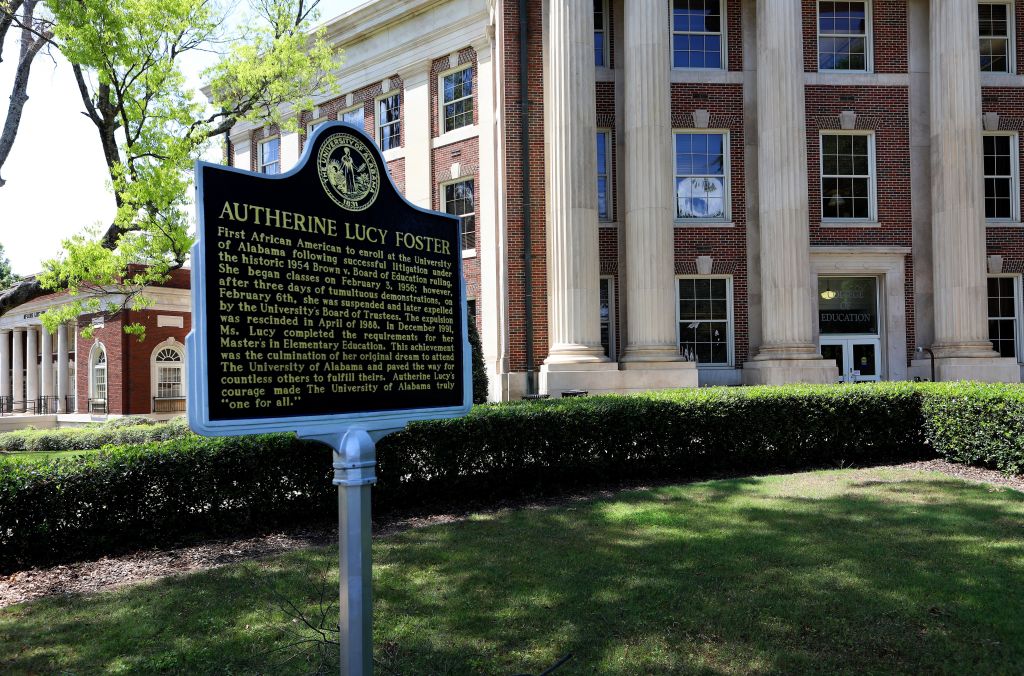University Of Alabama Renames Building To ‘Honor’ It’s First Black Student Alongside KKK Leader Alum
Autherine Lucy Foster Historic marker stands outside Bibb Graves Hall at the University Of Alabama in Tuscaloosa, Alabama, on July 5, 2018. | Source: Raymond Boyd / Getty
Only the most tone-deaf of college administrators could think it’s a good idea to “honor” its first Black student alongside a notable alumnus who just happened to also be a Ku Klux Klan (KKK) leader — during Black History Month, at that.
Yet, here we are.
On Thursday, the University of Alabama Board of Trustees voted to add the name of Autherine Lucy Foster, the first Black student ever enrolled there, to a campus building known as Graves Hall, which was named for Bibb Graves, a graduate of the university who went on to become the state’s first two-term governor — and, who was also notably a “Grand Cyclops” in the KKK, according to the Crimson White, the university’s student newspaper.
#OnThisDay in 1956, Autherine Lucy, the first Black student admitted to the University of Alabama attended classes but was then suspended after White students rioted in protest.#BHM pic.twitter.com/WtxHbOkE2v
— NatCivilRightsMuseum (@NCRMuseum) February 3, 2022
Thursday was also the 66th anniversary of Foster enrolling at the University of Alabama. The building now officially goes by Lucy-Graves Hall.
Autherine Lucy, as she was called back in 1952 while beginning her historic years-long quest to integrate the University of Alabama, applied to enroll as a graduate student after earning her bachelor’s degree from nearby Miles College, an HBCU. She was quickly accepted, but that offer was rescinded when the university found out she was Black. That prompted Lucy to sue the University of Alabama. But before her case was decided, the U.S. Supreme Court ruled in the landmark Brown v. The Board of Education case that segregation was against the law, clearing the way for Lucy’s ultimate matriculation at the University of Alabama on Feb. 3, 1956.
The honor of having a campus building named for Foster is well overdue.
Autherine Lucy and her lawyer Thurgood Marshall enter the NAACP office for a press conference on March 2, 1956. | Source: New York Daily News Archive / Getty
However, in an era that has seen universities rename buildings and other landmarks that celebrated racist figures in history, the University of Alabama’s decision to not only keep Graves’ name but also to attach it to Foster’s defies conventional wisdom.
The chairman of the group that decides what to name buildings on the University of Alabama’s campus defended the decision and suggested Graves — who was a Grand Cyclops in the KKK during the early stages of his governorship from 1935 to 1939 — actually had Black people’s best interest at heart.
“Some say he did more to directly benefit African American Alabamians than any other governor through his many reforms,” said Trustee Emeritus Judge John England, Jr., who leads the group that was created in June 2020 likely out of the purported national racial reckoning following the murder of George Floyd in Minneapolis.
He later added: “Unfortunately, that same Governor Graves was associated with the Ku Klux Klan.”
The word “associated” seems to be an understatement.
Not only was Graves just associated with the Klan, but he was a Grand Cyclops, “a chief officer of a Ku Klux Klan chapter, who appoints others to leadership positions,” the Crimson White wrote in its report, underscoring his influence in the then-powerful white supremacist hate group that continues to inspire anti-Black sentiment and actions.
University of Alabama students at Tuscaloosa gather in a demonstration on the campus following the recent admittance of the first Black student (Lucy Autherine) to the school on Feb. 5, 1955. The demonstration, which drew several hundred participants, was the second in two nights. | Source: Bettmann / Getty
England suggested everything is relative when he asked, “should this man’s initial and temporary political association with such an organization outweigh the tremendous progress and positive impact achieved?”
It is unclear who he asked, though, since it’s doubtful any self-aware Black person would answer in the affirmative.
The web page for the University of Alabama Board of Trustees shows that just three of the 12 trustees are Black.
The Crimson White’s editorial board published a scathing rebuke to the decision.
“The trustee’s latest renaming effort shows its inability to abandon its racist legacy despite researching campus building namesakes for a year and a half,” the CW Editorial Board wrote.
The University of Alabama is far from the only college in the state to have a building named for Graves. Even Alabama State University, an HBCU, had a building named for him up until 2020 when the dorm was renamed.
This is America.
SEE ALSO:
University Of Utah Investigates Alleged KKK Campus Recruiting, Feces Smeared On Black Student’s Dorm
Pro-KKK Georgia Republican Who Said Civil War Was About ‘Property’ Loss Won’t Seek Re-Election
[ione_media_gallery id=”4285008″ overlay=”true”]

